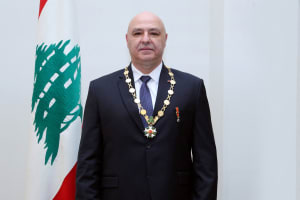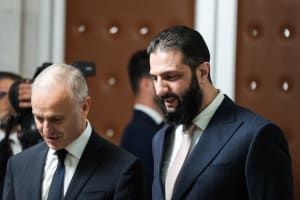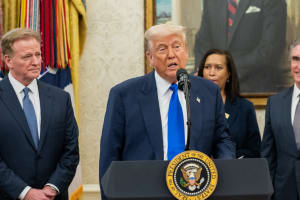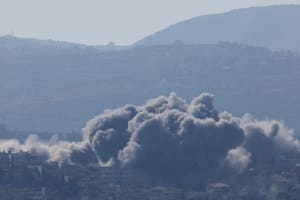Can Lebanon make peace with Israel and join the Abraham Accords now that Hezbollah is shattered? Can Trump help make it happen?
The urgent and historic case for normalization

Lebanon was once known as the “Switzerland of the Middle East” – beautiful, stable, peaceful, and prosperous.
Now it lies in ruins.
Yet I believe there is hope for the Lebanese people if they will seize the current crisis and turn it into an historic opportunity.
Let me explain.
A VISION OF PEACE AND ECONOMIC COOPERATION
The Hamas invasion of Israel on Oct. 7, 2023, and the subsequent war that led Israel to destroy, or nearly destroy, Hamas and Hezbollah – two of Iran’s most important terror proxies – has radically transformed the geopolitical equation in the region.
Israel’s success in obliterating 80% of Hezbollah’s missile force and assassinating 18 of the top Hezbollah leaders, including Sheikh Hassan Nasrallah, has also brought clarity.
Returning to the status quo ante of constantly repeating conflicts followed by successive rounds of ceasefires is unfeasible and immensely destructive for the region in the long-run.
The critical question now is this: Can Lebanon – newly liberated from its slave-masters in Tehran – decide to reassert its national sovereignty and choose to make peace with Israel and join the Abraham Accords?
A year ago, the very notion was lunacy.
Now, it is a live possibility.
IN BIBLICAL TIMES, LEBANON AND ISRAEL LIVED IN PEACE
Don’t get me wrong – I’m not saying the road to normalization between Israel and Lebanon would be simple or easy.
But suddenly it is possible.
Indeed, we at ALL ARAB NEWS believe Evangelical Christians in the Epicenter and around the world should now start praying and working towards this very goal: peace between Israel and Lebanon in our times, just as peace prevailed between the two nations during the Biblical times of Solomon, king of Israel, and Hiram, king of Tyre.
Most people – even most Christians – are not aware of the extraordinary dynamic of cooperation and economic commerce that existed when wise and thoughtful men ruled our two countries.
But read I Kings chapter 5.
Discover this encouraging history for yourself.
And join us in prayer for it to happen again.
TRUMP AND HIS TEAM HAVE A HISTORY-MAKING OPPORTUNITY BEFORE THEM
The Trump-Vance administration should use the current ceasefire between Israel and Hezbollah as leverage to promote normalization between Israel and its northern neighbor.
This would help curb Iranian and Hezbollah influence in the region and serve the interests of both nations.
Oct. 7 was not only a failed attempt by radical Islamists – both Arab and Persian, both Sunni and Shia – to humiliate and destroy the Jewish state, it was also a failed attempt to derail the normalization process between Israel and moderate Arab countries.
The Abraham Accords were the single most hope-inspiring and prosperity-generating regional development in generations.
Despite the ongoing war and accompanying incitement campaigns on social media, Israel’s relations with multiple Arab countries – including Morocco, Bahrain, and the U.A.E. – are steadfast.
The Kingdom of Saudi Arabia has certainly been more critical of Israel but it has also expressed interest in continuing normalization talks.
If Arab leaders rightly decide that returning to the volatile pre-Oct. 7 reality is insane, there is in fact a unique window of opportunities to advance long-term stability and prosperity in the Middle East.
The entry of a new American administration under the political father of the Abraham Accords, President-elect Donald Trump, dramatically enhances the current momentum’s positive change potential.
Trump and his team want to make peace.
They are looking for geopolitical wins.
A normalization deal between Israel and Lebanon would be huge.
A history-making opportunity is before Trump and his team.
Let’s pray they can take full advantage of it.
QUIET TALKS ARE ALREADY IN MOTION
Behind the scenes, quiet diplomacy is already underway.
As of Nov.16, 2024, negotiations between Israel and Lebanon entered the phase of draft exchanges, with the Biden administration having delivered a proposal to Lebanon’s Parliament Speaker Nabih Berri.
This happened at a time when Hezbollah had been massively weakened militarily, politically and economically by Israel’s military and intelligence operations.
Two months later, Hezbollah is vastly weaker.
And Lebanon has finally elected a reasonable and responsible new President – Joseph Aoun, a Maronite Christian – who is not a puppet of Iran or Hezbollah.
Such developments make normalization more possible than ever.
Joining the Abraham Accords would be a major step towards revamping Lebanon’s troubled economy, security, and socio-political arena, all of which have been greatly damaged since the Lebanese civil war of the late 20th century and Hezbollah’s destructive de facto rule thereafter.
The region had already seen promising hints of constructive dynamics between Israel and Lebanon.
The 2020 negotiations over maritime and marine gas – conducted at a time before the ongoing conflict and when Hezbollah remained largely in control – concluded two years later with an agreement between the two sides, proving that diplomacy remains a powerful path.
Should the ceasefire between Israel and Lebanon be extended – and Lebanese army forces push Hezbollah out of the region south of the Litani River – such diplomatic achievements could evolve into talks for normalization, which would also benefit the broader local and international arenas.
The United States, as well as France and the Gulf Arab states, can assist in these talks and curb the influence of the Ayatollah regime and its proxies.
HOPEFUL INDICATORS: BRAVE LEBANESE VOICES ARE BEGINNING TO CALL FOR PEACE
“A promising indication that normalization is not utopian wishful thinking comes from the expanded emergence of voices within Lebanon expressing public support for normalization between Israel and their nation,” one diplomatic source tells ALL ARAB NEWS.
“These range from attorney and legal activist Majed Harb, to geopolitical analysts and journalists such as Eli Khoury, Mazen Abboud and Friedmann Senior Fellow Hanin Ghaddar, and even to political figures such as Kataeb Party leader Samy Gemael, the Maronite Patriarch Bechara Boutros al-Rahi, and many others who cautiously express their support due to the immediate physical threat by Hezbollah,” the source told us.
Are these isolated voices?
Or do they represent courageous social leaders who speak for many more Lebanese citizens?
This remains to be seen.
But the common denominator is that they are expressing positions which go against the hardline hostility of Hezbollah and their Ayatollah handlers, while hinting at the deteriorating reputation of Hezbollah as an overall negative and destabilizing force in the ravaged and war-torn Levantine nation.
In parallel, the diversity of these voices have the chance to unite Lebanese citizens (and their large and influential diaspora) and form a multi-ethnic and multi-religious Christian-Muslim coalition aimed at serving the interests of Lebanon, and not of outside actors.
Such a coalition would comprise of both parliamentary elements as well as technocrats and members of civil society.
THE ROAD TO ECONOMIC GROWTH, BETTER JOBS, GROWING WAGES
While future economic cooperation between a post-normalization Israel and Lebanon is currently only hypothetical, one can already see a number of ways in which such cooperation can develop in the absence of the threat of conflict and war.
As previously seen in the early 2020’s, their mutual access to the Mediterranean Sea and to massive deposits of natural gas may evolve into joint energy exploration, extraction and infrastructure projects.
More renewable sources such as wind and solar energy could also prove sources for joint ventures, with Israel (at least initially) providing relevant technology and expertise, so as to address the known current energy shortages in Lebanon.
Energy is not the only source of hope.
The potential opening of trade routes between Israel and Lebanon could bolster regional trade.
Both nations’ shared ancient history can also become a source of joint archeological studies, heritage restorations, and multi-national tourism.
In addition, the high tech sector is another important arena, in which Israel and Lebanon can collaborate and innovate.
Lebanon’s diaspora, already known for its entrepreneurship and economic success stories, can help in bringing a post-normalization Lebanon back up onto her two feet with their experience and connections.
Europe should play a proactive and constructive part in all of this.
France, backed and supported by Germany, and along with the United States, could both promote and ensure economic advancements through their investments and the developing of the necessary infrastructure, research, technical support, and last but certainly not least, fair oversight and mediation between both sides.
Economic reforms are a priority.
They should aim at eliminating the terror-funding financial infrastructure set up by Hezbollah on account of the country’s traditional dollarized banking sector that was always aligned with the U.S. Treasury.
A post-normalization Lebanon could see it returning to a state unseen since the outbreak of its civil war in the 1970s.
What’s more, the reduction of political and security threats would attract foreign investment and trade, energizing Lebanon's desperate economy and providing much needed income to Lebanese citizens.
WHAT IS THE BOTTOM LINE?
The bottom line is that never before in the modern histories of Lebanon and Israel has the possibility of peace and normalization between these countries existed.
The potential benefits are bountiful and indisputable.
The real question is this: Do the leaders of both countries have the vision and courage to chart a path to peace, and will President Trump and his Arab and European allies offer to help?
I am praying the answer is yes.
I hope you will, too.
This article originally appeared on ALL ARAB NEWS.

Joel C. Rosenberg is the editor-in-chief of ALL ISRAEL NEWS and ALL ARAB NEWS and the President and CEO of Near East Media. A New York Times best-selling author, Middle East analyst, and Evangelical leader, he lives in Jerusalem with his wife and sons.
You might also like to read this:















